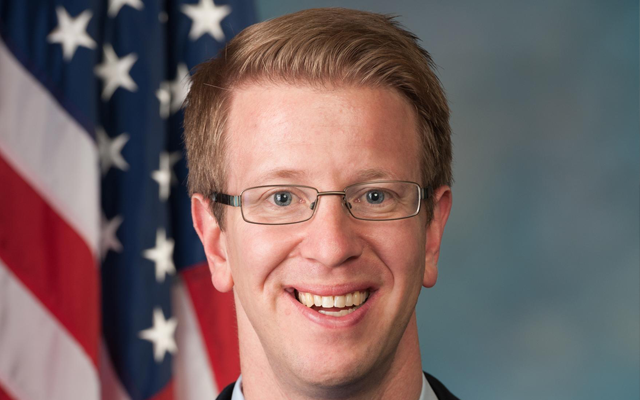Kilmer backed appropriations package includes local issues

In a release from Representative Derek Kilmer, he states that the U.S. House of Representatives has passed H.R. 2740, an appropriations package consisting of four bills that fund federal agencies including the departments of Labor, Health and Human Services, Education, Defense, State, and Energy.
Included in the resolution that would look to reduce jet noise on the Olympic Peninsula and other areas.
“Today, I was proud to support an appropriations package that makes progress on important priorities for our region,” said Rep. Derek Kilmer . “This bill will continue to invest in our military installations, ensure access to quality and affordable health care, spur energy innovation, fight climate change, and invest in our kids.”
The measures in the package that were specifically backed by Kilmer include
A requirement for the Navy to measure jet noise generated by Growler activities, make those measurements available to the public, and work with affected communities to mitigate potential impacts of these activities. Also included is an additional $2 million investment to continue to develop technologies that can reduce jet noise.
The bill also contains several provisions that are meant to protect access to affordable and high-quality health care in rural areas.
Part of this focus is an effort to secure an update on the best practices and strategies to help attract health care practitioners to rural clinics and hospitals in areas with health care professional shortages, like the Olympic Peninsula.
Additionally, Rep. Kilmer included a request for the Health Resources and Services Administration (HRSA) to conduct a review of the National Health Service Corps (NHSC) Loan Repayment Program, to determine how this program could better address the health care needs of rural communities by identifying more effective strategies to encourage health care providers to practice in designated shortage areas.
Rep. Kilmer authored a provision that looked to halt a new policy from the Centers for Medicare and Medicaid Services (CMS) known as “site neutrality,” which would cost Olympic Medical Center (OMC) $47 million over ten years. The provision directs CMS to reconsider the rule and take into account the negative effects to hospitals like OMC that are designated as a Sole Community Hospital or are located in a Health Professional Shortage Area.
“The CMS policy of ‘site neutrality’ will significantly reduce access to needed physician care for the elderly, low income and sickest patients in rural areas served by Sole Community Hospitals,” Eric Lewis, CEO, Olympic Medical Center. “Safety net hospitals serving these patients in both urban and rural areas face a 60% reimbursement cut in physician practice expenses, and patient access is going to be negatively impacted. I’m grateful for Rep. Kilmer’s continued efforts to fix this problem and help protect access to care in rural areas.”
Other items included by Kilmer include;
From the Kilmer Release:
Investing in the Shipyard
Recognizing the important role that the Puget Sound Naval Shipyard plays in our national defense and local community, Rep. Kilmer fought to increase funding available for facilities improvements and upgrades at the Puget Sound Naval Shipyard and ultimately secured $12 million in funding above the budget request for such enhancements at the Navy’s public shipyards.
Rep. Kilmer also championed a $30 million increase for the Office of Economic Adjustment, which helps communities near defense installations – like those around Naval Base Kitsap and JBLM – plan for and implement future infrastructure projects that improve the quality of life for folks, including civilians and members of the armed services and their families, living in the surrounding areas.
In addition, the spending bill included a 3.1 percent pay increase for members of the armed forces.
“I want to express appreciation to Congressman Kilmer for fighting to increase funding for improvements at PSNS and for future infrastructure investment near the base in Bremerton,” said Bremerton Mayor Greg Wheeler. “This financial support will continue to ensure PSNS maintains a strong military presence here and will help meet the needs of individuals and families living in our community.”
Supporting Investments in Innovative Medical Research
To keep the United States on the forefront of medical research that is critical to combating terminal diseases and improve patient outcomes, Rep. Kilmer worked to secure a $2 billion increase in funding for the National Institutes of Health (NIH). The $41.1 billion in funding provided for NIH includes $2.4 billion for Alzheimer’s disease research, $3.2 billion for HIV/AIDS research, and $195 million for the Cancer Moonshot research initiative.
Examining Opportunities to Expand Apprenticeships
To help ensure that America’s youth are able to keep up with a changing economy, Rep. Kilmer championed an effort to ensure the U.S. Department of Education conducts a survey of high school youth apprenticeship programs to identify programs that culminate in transferrable, industry-recognized credentials or post-secondary credits, in order to replicate effective programs in more schools and communities across the region.
Growing Computer Science Opportunities in Schools
In a continued effort to expand computer science education to more K-12 classrooms, Rep. Kilmer advocated for the Department of Education’s Supporting Effective Educator Development (SEED) programs, which help fund projects that increase the number of teachers with computer science certifications. These projects are specifically aimed at increasing computer science certified teachers in underserved areas, including rural public schools and those serving higher percentages of Native American students.
In addition, Rep. Kilmer championed an effort for the Department of Education’s Office of Civil Rights to collect data on access to computer science programs in K-12 classrooms in order to help identify areas to more effectively grow the programs.
Supporting Clean Energy Research and Development and Efforts to Combat Climate Change
The bill significantly increases funding for the Department of Energy (DOE) to invest in clean energy technologies to change the energy sector and more effectively address the critical economic, environmental, and energy security challenges facing the nation as the result of climate change. Included in the legislation is an initiative championed by Rep. Kilmer to make $10 million available for the Water Power Technologies Office’s Powering the Blue Economy initiative, which is focused on developing marine hydrokinetic energy and creating more resilient coastal communities. This funding will help to continue ongoing work at the DOE funded Marine Sciences Laboratory in Sequim.
Additionally, the bill includes $425 million in funding for the Advanced Research Project Agency – Energy (ARPA-E) to support research aimed at quickly developing energy technologies that have the potential to change the energy sector and address critical challenges. The bill also includes $2.65 billion – a $272 million increase from the FY 2019 enacted level – for the Energy Efficiency & Renewable Energy (EERE) program to ensure that American continues to lead in the transition to a global clean energy economy.
Importantly, the legislation also prohibits the use of funds to withdraw from the Paris Climate Agreement.
The legislation passed the House of Representatives 226-203.
A division-by-division summary of H.R. 2740 is available as a PDF here. Amendments to each division of the bill are available here.



